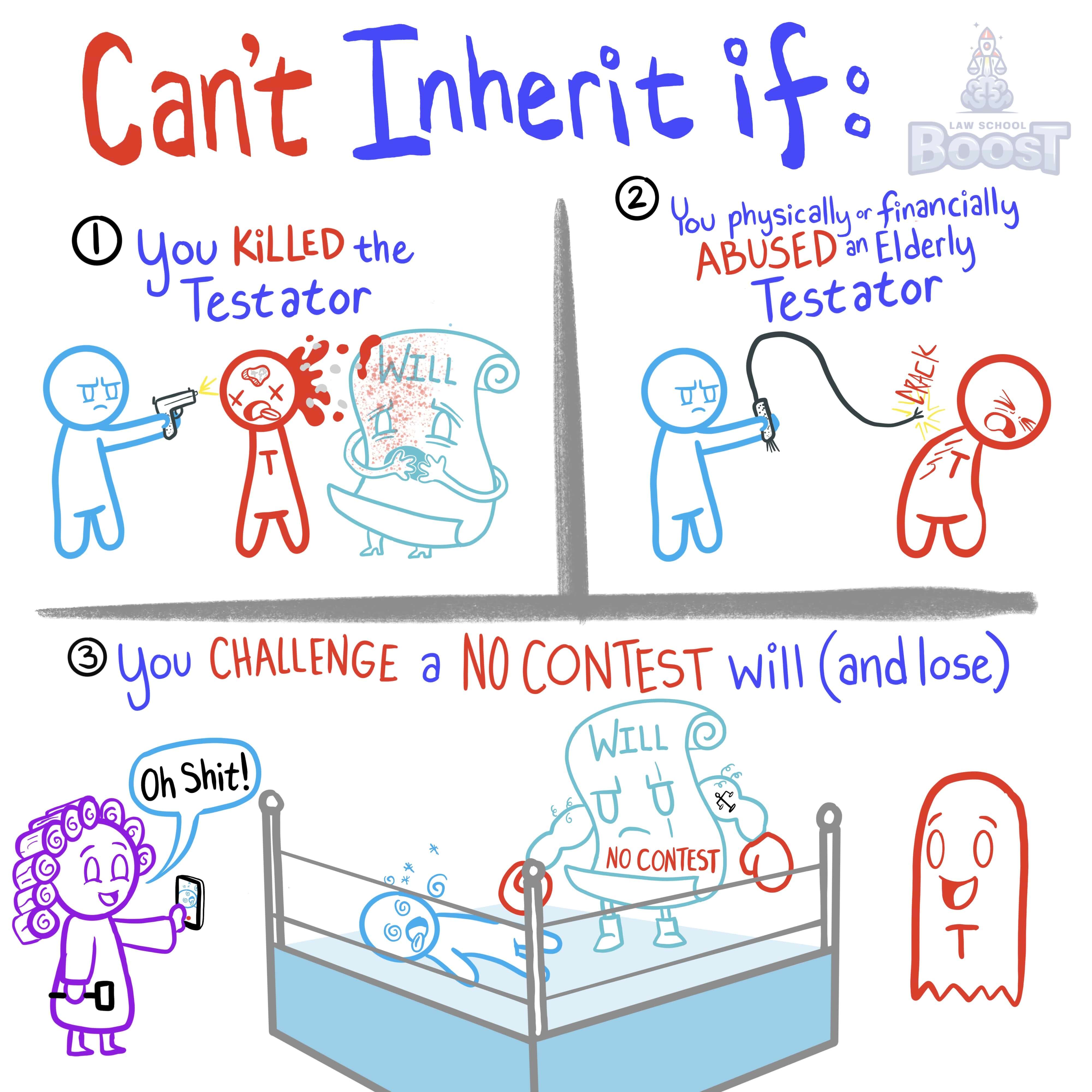😭
Wills • Bars to Succession
WILLS#052
Legal Definition
A beneficiary is barred from receiving their share if they: (1) feloniously and intentionally kill the decedent (as determined by conviction or where the probate court makes a finding by preponderance of the evidence; (2) commit elder abuse—financial or physical—of the decedent; or (3) bring an unsuccessful will contest when a "no contest" clause exists.
Anti-lapse does not apply, so the issue of a killer will not take.
Anti-lapse does not apply, so the issue of a killer will not take.
Plain English Explanation
A court may step in and prevent a will from gifting to certain people when those certain people do naughty things. For example, if Bob leaves his estate to his son Timmy, but Timmy is convicted of murdering Bob, a court isn't going to reward Timmy by giving him Bob's estate even if that's what Bob's will states. Similarly, if Timmy was found to be abusing his elderly father, the courts will be less interested in passing the father's estate to him. Finally, some dead people want to avoid drama after they die, so they include "no contest clauses" in their will. A no contest clause basically states that anyone who brings a lawsuit to contest (i.e., disagree with) the will forfeits anything they were going to gain under the will. Thus, if someone brings a suit to contest the will and loses, they may also lose anything that was going to come to them via the will.
Hypothetical
Hypo 1: Bob is convicted of intentionally causing the death of his aunt who had named him as a beneficiary in her will. Result: Bob is barred from receiving his inheritance due to his felonious and intentional actions against his aunt.
Hypo 2: Amy is an elderly person whose nephew takes care of her. The nephew starts taking money from Sam's accounts without her permission and is later found guilty of elder abuse. Result: Since the nephew committed elder abuse against Sam, he is barred from receiving any inheritance from her estate.
Hypo 3: Bob contests the validity of Sam's will, which contains a "no contest" clause. The court finds the will valid and Bob's contest unsuccessful. Result: Bob is barred from receiving his share of the estate due to his unsuccessful will contest, as stated in the "no contest" clause.
Hypo 4: Sam leaves a substantial amount in his will to Bob. After Sam’s death, Bob is wrongly accused and then acquitted of causing Sam's death. Result: Since Bob is not convicted of feloniously and intentionally killing Sam, he is not barred from receiving his inheritance.
Hypo 5: Sam leaves his estate to her friend Bob. After Sam’s death, Bob is found guilty of a felony unrelated to Sam. Result: Bob is not barred from receiving his inheritance as his felony conviction is unrelated to Sam or his death.
Hypo 2: Amy is an elderly person whose nephew takes care of her. The nephew starts taking money from Sam's accounts without her permission and is later found guilty of elder abuse. Result: Since the nephew committed elder abuse against Sam, he is barred from receiving any inheritance from her estate.
Hypo 3: Bob contests the validity of Sam's will, which contains a "no contest" clause. The court finds the will valid and Bob's contest unsuccessful. Result: Bob is barred from receiving his share of the estate due to his unsuccessful will contest, as stated in the "no contest" clause.
Hypo 4: Sam leaves a substantial amount in his will to Bob. After Sam’s death, Bob is wrongly accused and then acquitted of causing Sam's death. Result: Since Bob is not convicted of feloniously and intentionally killing Sam, he is not barred from receiving his inheritance.
Hypo 5: Sam leaves his estate to her friend Bob. After Sam’s death, Bob is found guilty of a felony unrelated to Sam. Result: Bob is not barred from receiving his inheritance as his felony conviction is unrelated to Sam or his death.
Visual Aids



